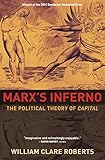Marx's Inferno : The Political Theory of Capital / William Clare Roberts.
Material type: TextPublisher: Princeton, NJ : Princeton University Press, [2016]Copyright date: ©2018Description: 1 online resource (304 p.) : 1 b/w illusContent type:
TextPublisher: Princeton, NJ : Princeton University Press, [2016]Copyright date: ©2018Description: 1 online resource (304 p.) : 1 b/w illusContent type: - 9780691180816
- 9781400883707
- Capitalism -- Political aspects
- PHILOSOPHY / Political
- Capital
- Charles Fourier
- Dante
- G. A. Cohen
- Inferno
- Karl Marx
- Owenism
- Pierre-Joseph Proudhon
- Robert Owen
- Saint-Simonians
- akrasia
- anarchy
- association
- capital accumulation
- capitalism
- capitalist exploitation
- capitalist mode of production
- collective force
- commerce
- domination
- expropriation
- force
- fraud
- labor power
- labor
- market society
- money
- overwork
- political economy
- political theory
- primitive accumulation
- republicanism
- separatism
- social Hell
- socialism
- surplus labor
- treachery
- wages
- workers' movement
- working class
- 335.412 23
- HB501.M37
- online - DeGruyter
| Item type | Current library | Call number | URL | Status | Notes | Barcode | |
|---|---|---|---|---|---|---|---|
 eBook
eBook
|
Biblioteca "Angelicum" Pont. Univ. S.Tommaso d'Aquino Nuvola online | online - DeGruyter (Browse shelf(Opens below)) | Online access | Not for loan (Accesso limitato) | Accesso per gli utenti autorizzati / Access for authorized users | (dgr)9781400883707 |
Frontmatter -- Contents -- Acknowledgments -- A Note on References and Translations -- 1. Introduction: Rereading Capital -- 2. Taenarus: The Road to Hell -- 3. Styx: The Anarchy of the Market -- 4. Dis: Capitalist Exploitation as Force Contrary to Nature -- 5. Malebolge: The Capitalist Mode of Production as Fraud -- 6. Cocytus: Treachery and the Necessity of Expropriation -- 7. Conclusion: Purgatory, or the Social Republic -- Bibliography -- Index
restricted access online access with authorization star
http://purl.org/coar/access_right/c_16ec
Marx’s Inferno reconstructs the major arguments of Karl Marx’s Capital and inaugurates a completely new reading of a seminal classic. Rather than simply a critique of classical political economy, William Roberts argues that Capital was primarily a careful engagement with the motives and aims of the workers’ movement. Understood in this light, Capital emerges as a profound work of political theory. Placing Marx against the background of nineteenth-century socialism, Roberts shows how Capital was ingeniously modeled on Dante’s Inferno, and how Marx, playing the role of Virgil for the proletariat, introduced partisans of workers’ emancipation to the secret depths of the modern “social Hell.” In this manner, Marx revised republican ideas of freedom in response to the rise of capitalism.Combining research on Marx’s interlocutors, textual scholarship, and forays into recent debates, Roberts traces the continuities linking Marx’s theory of capitalism to the tradition of republican political thought. He immerses the reader in socialist debates about the nature of commerce, the experience of labor, the power of bosses and managers, and the possibilities of political organization. Roberts rescues those debates from the past, and shows how they speak to ever-renewed concerns about political life in today’s world.
Mode of access: Internet via World Wide Web.
In English.
Description based on online resource; title from PDF title page (publisher's Web site, viewed 01. Dez 2022)


